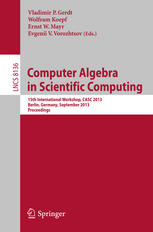

Most ebook files are in PDF format, so you can easily read them using various software such as Foxit Reader or directly on the Google Chrome browser.
Some ebook files are released by publishers in other formats such as .awz, .mobi, .epub, .fb2, etc. You may need to install specific software to read these formats on mobile/PC, such as Calibre.
Please read the tutorial at this link: https://ebookbell.com/faq
We offer FREE conversion to the popular formats you request; however, this may take some time. Therefore, right after payment, please email us, and we will try to provide the service as quickly as possible.
For some exceptional file formats or broken links (if any), please refrain from opening any disputes. Instead, email us first, and we will try to assist within a maximum of 6 hours.
EbookBell Team

0.0
0 reviewsThis book constitutes the proceedings of the 14th International Workshop on Computer Algebra in Scientific Computing, CASC 2013, held in Berlin, Germany, in September 2013. The 33 full papers presented were carefully reviewed and selected for inclusion in this book.
The papers address issues such as polynomial algebra; the solution of tropical linear systems and tropical polynomial systems; the theory of matrices; the use of computer algebra for the investigation of various mathematical and applied topics related to ordinary differential equations (ODEs); applications of symbolic computations for solving partial differential equations (PDEs) in mathematical physics; problems arising at the application of computer algebra methods for finding infinitesimal symmetries; applications of symbolic and symbolic-numeric algorithms in mechanics and physics; automatic differentiation; the application of the CAS Mathematica for the simulation of quantum error correction in quantum computing; the application of the CAS GAP for the enumeration of Schur rings over the group A5; constructive computation of zero separation bounds for arithmetic expressions; the parallel implementation of fast Fourier transforms with the aid of the Spiral library generation system; the use of object-oriented languages such as Java or Scala for implementation of categories as type classes; a survey of industrial applications of approximate computer algebra.